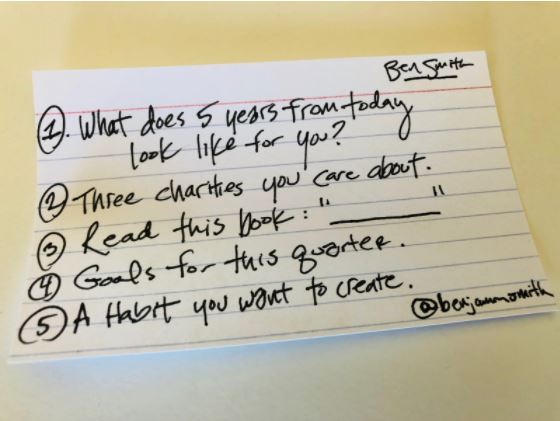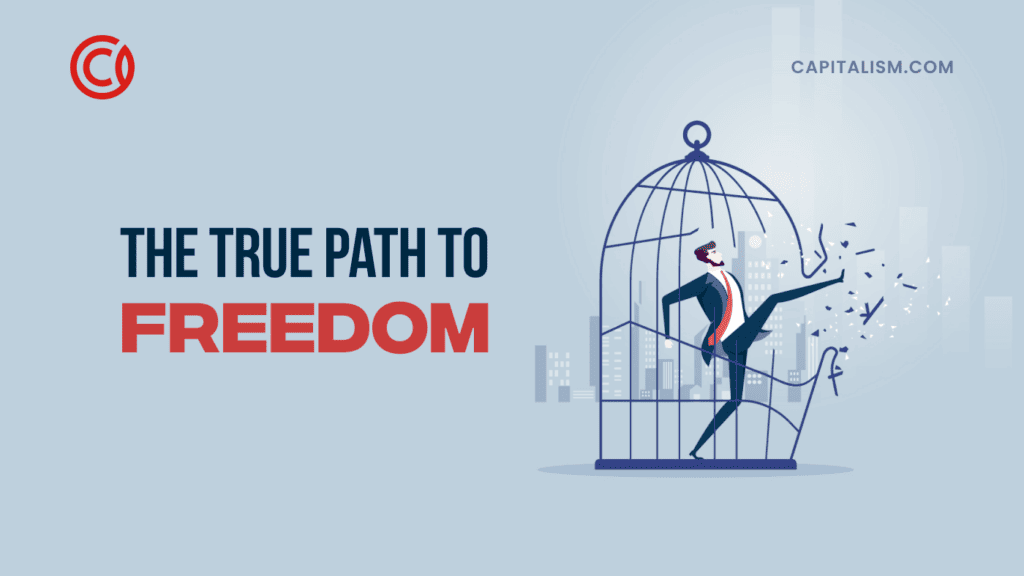As a startup CEO, I’m often expected to have all the right answers. But I discovered a while back that there may be more power in having all the right questions. Especially when it comes to finding and hiring (and keeping) the best people for your team.
You see, when I started asking the right questions to grow my team, everything changed. I started getting hockey stick growth nearly immediately. It turned out I could get more productivity out of five questions on an index card than I could from spending thousands of dollars on expensive recruiters and HR help.
Let me share with you the index card that has transformed the way our team operates:

This card lists the five questions I ask people before deciding if I should hire them. It helps define exactly what I need in order to grow our team, and serves as a written reminder of our shared goals.
To be clear, it’s meant to be a bit cheesy. I need employees who laugh, yet subtly start to accept the notion that we’re on a journey. If I foster shared camaraderie while promoting self-development for the individuals on my team, who cares if it comes with a little cheese? The cheese element is a silly way for all of us to come together and make light of something as a team. Usually that means a laugh at my expense. And that’s the way I like it.
Each question on the card has a very specific purpose. Again, these are just my questions -- you can develop your own as you determine what’s most important to your company.
Here’s why I ask these five questions:
1. Tell me about you 5 years from today. What does your life look like?
Only once I found myself in middle age did I begin to understand how business is more than about making money. Once I hit 40, I realized my time on this planet is limited. I realized I’m choosing to spend my limited days on this daily project, with this team.
I realized I need to feel good about my time on earth. It sounds trite but if I told the 12-year-old version of myself that selling physical products on Amazon was how I was going to spend the prime (pun intended) years of my life, I’m pretty sure that young boy would also want to know I was making the world around me a little better, too.
This all means it’s my personal duty to make sure the people I hire are encouraged to work toward their personal goals. I need them to know I take their journey seriously, and that I’m not forgetting their personal goals.
By asking them to tell me about their life five years from now, I not only get a sense of their goals, but what motivates them. When performance may dip, or we find an inevitable slow moment, I can remind the employee of how this teamwork fits in the bigger picture of where they personally are going in life.
Asking this question also allows me to celebrate with people when they hit their goals. I remember when one of my best young employees was able to buy his first home thanks to the extra work he did for our team. It was a fantastic feeling to see that employee walk through the door the morning after his first night in the new house. We were all cheering and high-fiving. Everybody was excited together.
2. Please share three local charities you care about.
I live in Los Angeles, a city that sells entertainment for a living. Sometimes it’s hard to see how this type of work can make a positive difference in life. I knew that firsthand: I worked at YouTube in its early days and always found myself worrying that my work there was trivial compared to the work being done by nonprofits and charities. But those little moments of laughing or inspiration that come from a good YouTube video do happen. And even if YouTube’s number one goal is to make you watch your screen for as long as humanly possible, those positive moments change lives.
This is why I make sure that every employee explicitly share a few causes that matter to them. It’s more than just talk: we as a team choose one charity or nonprofit a week and do something to help them. It doesn’t matter if it’s a thank you letter, a monetary contribution or time volunteered -- what matters is that we’re in the habit of anchoring our daily work to the groups and causes we care about. We grow as a team and as people. It’s a no-brainer.
3. Read this book: “XXXXX”
During the interview process, this one is more in the hypothetical sense. You can let the interviewee know that if you are hired, there will be required reading ahead.
I love assigning a book to read to a fresh hire on the team. This assignment works on a number of levels. First, the task communicates that our team is in the habit of learning new things on an ongoing basis. That’s important. But also down the road, it allows me to see who has followed through with the book.
Frankly, a deadline to finish reading a book can be a pain in the you know what. So I get to see how new employees handle a pain-in-the-butt request from me from day one. I’m going to know how you handle me making requests that are undoubtedly positive, yet need some diligent extra personal work that’s hard to fake. I always suggest books that I have personally read before, so we can have a in-depth conversation.
4. Send me your best guess at the specific goals you want to achieve for the company this quarter.
This is the only question on the index card that is actually about the day-to-day work we’re all doing together. I sneak it in the middle. I want the new teammate to create their day-to-day work goals with all of the other questions on the card effectively “priming” their response. If the other index card questions put the new teammate into a state of positive goal setting and reflection, then I’m going to get a much stronger response when the new teammate creates their quarterly work goals.
I know the questions on the card also personally keep me intellectually honest. When I write down my work goals, I know I’m less willing to compromise on my dreams. I’m more aware of my personal vision, and will do the extra work to make sure we hit upon my particular vision.
When I’m having a bad day and I want to cut corners, I remind myself of this card. I tell myself:
Protect the day.
Protect what I do.
Protect what I say.
And when I say these affirmations and review this card, I actually go the extra mile. It’s now a habit.
5. Tell me about a habit you want to create.
Speaking of habits, I want each member of our team to work on a personal habit. I don’t care what the habit is -- it can be anything.
I learn so much from the answers I get from this question. If I get a positive, un-sarcastic response, then I know this person is one of us. It means they are a fit within our tribe. Hungry. Aggressive. Willing to sacrifice. Willing to do the work first. A team player.
If I get a negative response, then I know it’s going to be an uphill battle. Frankly, this question weeds out good people -- and that’s ok, because I’m aiming for great. It’s only when you have hired mediocre players that you realize how important it is to aim for the very best.
A final thought
In sports, there’s a popular saying: “trust the process”. The idea is that by focusing on process and daily habits rather than outcomes, the team will come out further ahead than before. When things are going great, it’s easy to be a team. But when things are hard, it’s the process and training we’ve performed that carries the day.
That’s what this index card is about. It helps us create a positive team culture. It allows us to trust the process.
Try it out and let me know what you think. Hit me up at bsmith@gmail.com or @benjaminsmith. I’d love to share your stories with the Capitalism.com audience.
MORE MINDSET SHIFTING POSTS ON CAPITALISM.COM:
• How To Avoid ‘Sparkly Objects’ And Stay Focused On What Really Matters To You
• The 1 Simple Truth All Successful Entrepreneurs Follow
• The #1 Lesson Jerry Seinfeld Learned That Led to His $860 Million Net Worth









